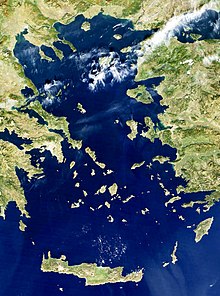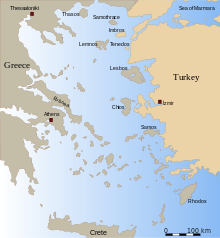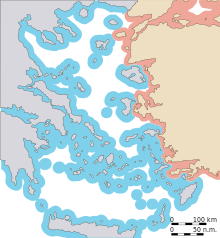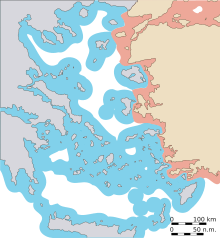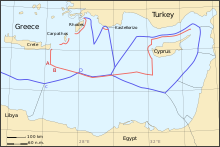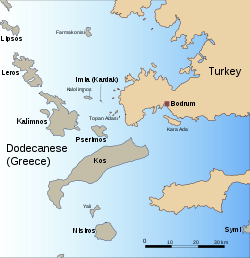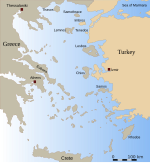Aegean dispute
According to a popular perception[clarification needed] of these issues in the two countries, Turkey is concerned that Greece might be trying to extend its zones of influence to such a degree that it would turn the Aegean effectively into a "Greek lake".
[6] In the context of the Aegean dispute, the term continental shelf refers to a littoral state's exclusive right to economic exploitation of resources on and under the sea-bed, for instance oil drilling, in an area adjacent to its territorial waters and extending into the High Seas.
The precise delimitation of the economic zones is the only one of all the Aegean issues where Greece has officially acknowledged that Turkey has legitimate interests that might require some international process of arbitration or compromise between the two sides.
As of 2009,[update] the current controversy over the FIR relates to the question whether the Greek authorities have a right to oversee not only civil but also military flight activities in the international parts of the Aegean airspace.
After the incident, both governments expressed an interest to revive an earlier plan of establishing a direct hotline between the air force commands of both countries in order to prevent escalation of similar situations in the future.
[112] Ankara asked for the agreement on maritime boundaries from the Government of National Accord (GNA) in the Libyan Civil War, in exchange for Turkey's long-time support against the rival Tobruk-based House of Representatives.
[163][164] On 9 June 2020, and in response to Turkey's moves in the region, Greece and Italy signed through their Foreign Ministers Nikos Dendias and Luigi Di Maio a "historic" agreement for the demarcation of the EEZ between the two countries.
[234] Josep Borrell announced that the European Union is preparing a list of sanctions against Turkey, including tough economic measures,[235] and the former Turkish Prime Minister Ahmet Davutoglu criticized openly his own country's "power projection" in the East Mediterranean, which, according to him, risks causing a military conflict.
[242] Due to Turkey's diplomatic isolation,[232][243][244][220][245] and just a week ahead of the EU Summit where sanctions against the EU-candidate country for its drilling activities were to be evaluated, Oruç Reis withdrew from Kastellorizo and the Turkish surveys on Greek continental shelf were halted.
However, a few days later, on 11 October, Turkey withdrew from the talks and resumed its gunboat diplomacy by releasing a NAVTEX announcing that it will be conducting surveys on the waters just 6.5 nautical miles off Kastellorizo[256][257] and redeployed its research vessel Oruç Reis, escorted by Turkish frigates, for this purpose.
[258] These Turkish moves drew the International community's condemnation, with Berlin decrying them as a "serious blow" to efforts at easing tensions in the East Mediterranean and accusing Ankara for "interplay between detente and provocation",[96][259][260] the German Foreign Minister Heiko Maas cancelling his planned official visit to Ankara,[261] and along with France, warning Turkey with consequences,[262] Greece's Foreign Minister Nikos Dendias declaring that "the Turkish leadership has shown it is not a credible interlocutor.
We must all face reality before it is too late",[263] the United States "deploring" Ankara for its moves, which the State Department described as "calculated provocations",[264][265] Austria's Chancellor Sebastian Kurz condemning Oruc Reis' redeployment and warning Turkey of sanctions,[266][267] Egypt's Foreign Minister Sameh Shoukry rejecting Turkey's gunboat diplomacy and policy of territorial expansion in the region,[268] Sweden's Foreign Minister Ann Linde warning that the Oruç Reis' redeployment is leading to new tensions instead of contributing to de-escalation,[96] Israel expressing its concerns over Turkey's destabilizing role in the East Med,[269] and Russia backing Greece's right to expand its territorial waters to 12 nautical miles and reaffirming that the UNCLOS is a "cornerstone" of the international law and applies to the Mediterranean Sea.
[96] On 17 October, Turkey passed a law expanding its search and rescue (SAR) area to cover all the new territories it claims in the Aegean and Mediterranean seas as part of its Blue Homeland theory.
[278][279] On 20 October, Greece and Albania agreed to resume negotiations for the demarcation of their maritime boundaries and that, in the event of no resolution, the two parties may jointly submit the case to the International Court of Justice in The Hague.
[302] The tensions come just a day after a high-level EUMed 9 Summit at Athens, where the heads of governments from 9 Mediterranean countries, including Croatia, Cyprus, France, Greece, Italy, Malta, Portugal, Slovenia and Spain, as well as the head of EU's Commission, Ursula von der Leyen, released a joint statement regarding the security and stability in the Mediterranean Sea, urging Turkey to "abstain, in a consistent and permanent manner, from provocations or unilateral actions in breach of international law".
[317] According to experts, the deal aims to become the basis for the creation of a European defense structure with its own autonomous dynamics and priorities, and part of Greece's efforts in deterring Turkey's neo-Ottoman expansionist policies in the region.
[325][326][327] Furthermore, in his letter accompanying the deal, Blinken vowed "to mutually safeguard and protect the sovereignty and territorial integrity of both countries against actions threatening peace, including armed attacks".
The Israeli ambassador to Athens, Yossi Amrani, when commenting about Çavuşoğlu's statements, pointed to the joint Israel, Cyprus and Greece declaration at the tripartite Jerusalem Summit earlier this month, which stressed the need for all countries to respect the sovereign rights of their neighbors in the region.
[351] Greece's Foreign Minister Nikos Dendias expressed his regret for Erdogan's remarks, stating that they go against the spirit of the United Nations's Universal Declaration of Human Rights (UDHR) and raises questions about Turkey's membership in the North Atlantic Alliance (NATO).
[352] Turkey's retired ambassadors, Yalım Eralp [tr] and Selim Kuneralp, questioned their country's foreign policy regarding the Greek islands, noting that it is harmful for its own interests.
This prompted strong reactions and condemnation both in Greece and abroad, with Athens regarding the unprecedented move as an aggressive act, and the Greek Prime Minister asking publicly the Turkish President to clarify his position on the new map, something he avoided doing.
[367][368] On August 23, Turkey's Defense Ministry claimed that Greek Air Force fighter jets placed radar locks on Turkish F-16s escorting US B-52 bombers as part of the NATO mission.
The European Union and its presiding country, the Czech Republic condemned Erdoğan's threats as "unacceptable",[386] while France's Foreign Minister Catherine Colonna responded by recalling the mutual assistance clause signed last year that unites Paris and Athens.
[384][389] According to Greek analysts, these threats of invasion made Greece's position appear more credible to the international community as the need to maintain a military presence on its islands for deterrence against Turkey is now fully justifiable.
No major disputes were resolved, however, the two leaders signed a non-binding declaration of friendship, and numerous bilateral agreements; including managing migration flows, and committed to continuing talks in Ankara in the spring of 2024.
[5] The first time a dispute between the two countries in the Aegean touched on questions of actual sovereignty over territories was in early 1996 at the tiny barren islets of Imia (known as Kardak in Turkey), situated between the Dodecanese island chain and the Turkish mainland.
The arguments exchanged concerned the interpretation of the Treaty of Lausanne of 1923, which forms the principal basis for the legal status of territories in most of the region, as well as certain later diplomatic dealings between Turkey, Greece and Italy.
[413][414] A regional Foreign Minister conference held on 11 May 2020 with the participation of Cyprus, Egypt, France, Greece and the United Arab Emirates, concluded with a joint declaration condemning Turkey for its practice of conducting armed overflights above the inhabited Greek islands.
However, a newly elected Greek government under Kostas Karamanlis, soon after it took office in March 2004, opted out of this plan, because Ankara was insisting that all the issues, including Imia and the "grey zones", belonged to a single negotiating item.
[426] According to Greece's Foreign Minister Nikos Dendias, the disputes which are plaguing the Greek-Turkish relations for decades, can easily be resolved once Turkey accepts the United Nations Convention on the Law of the Sea (UNCLOS).
